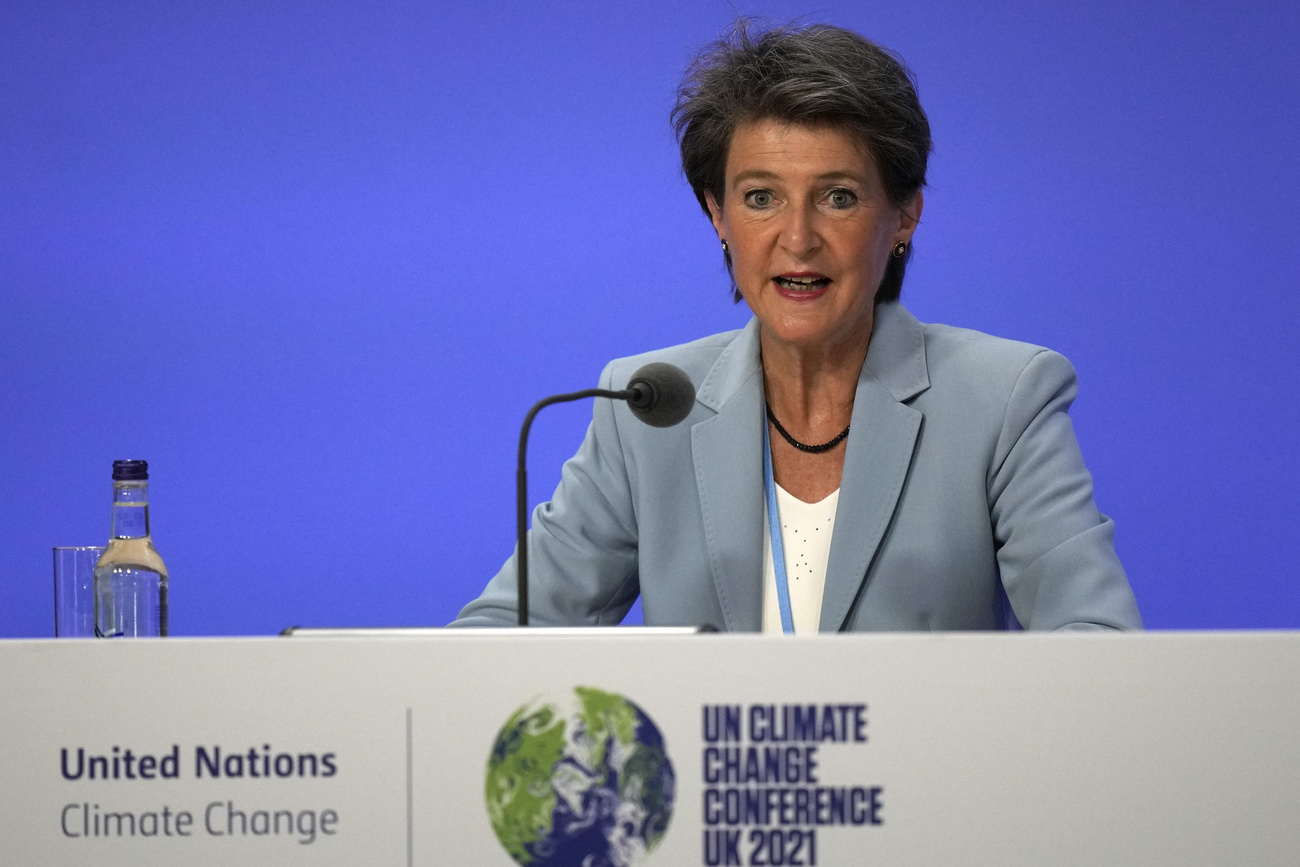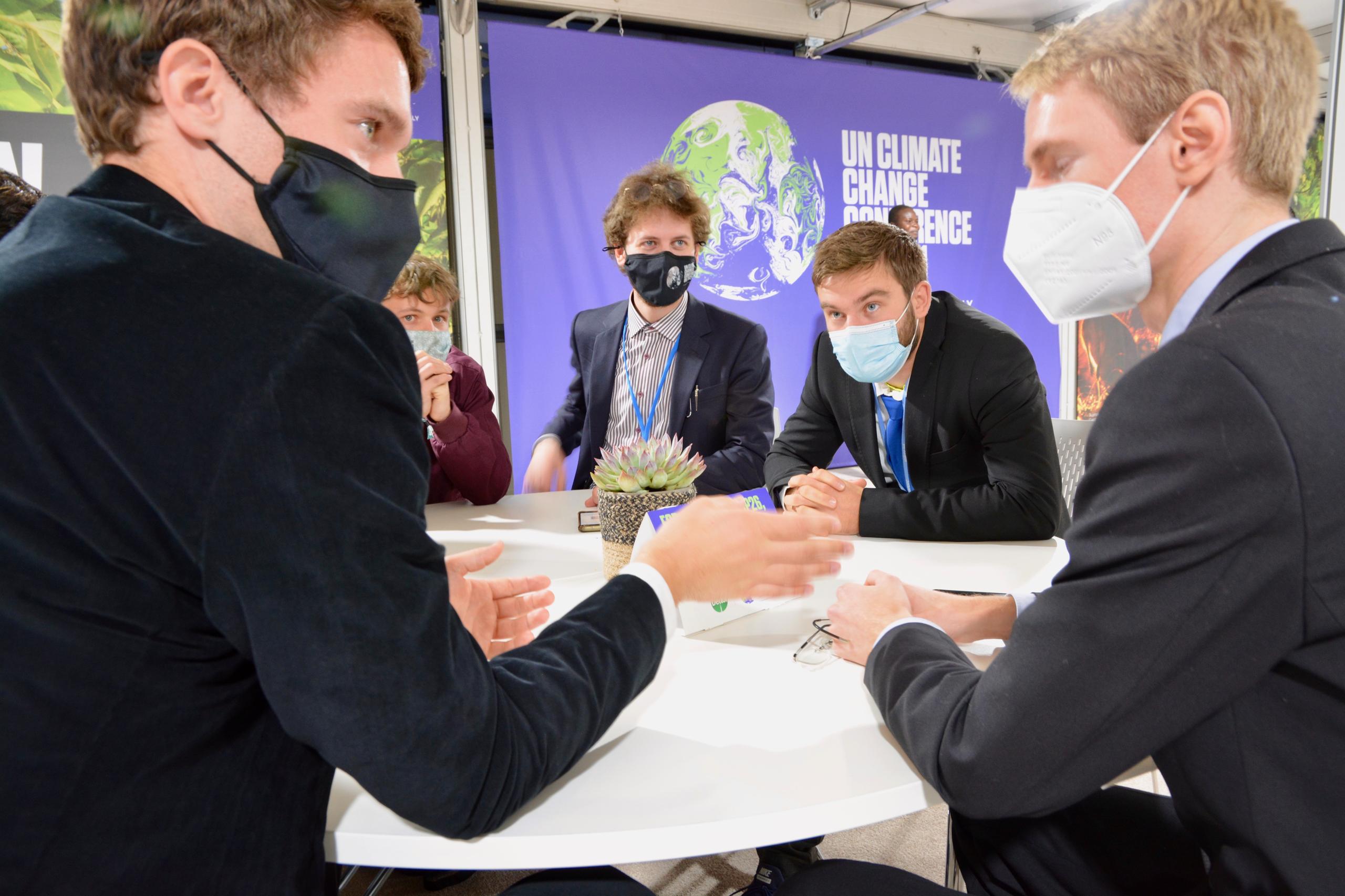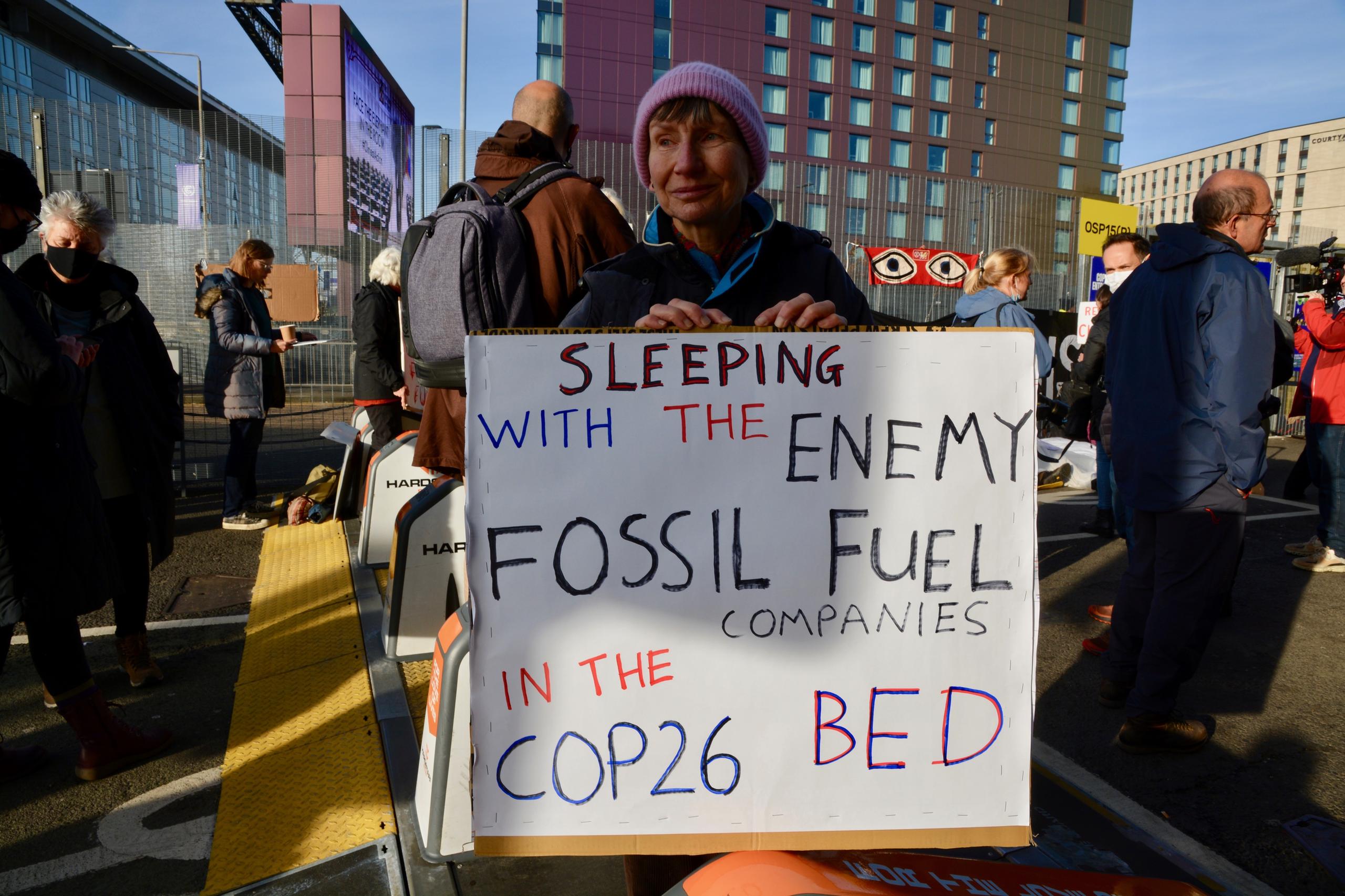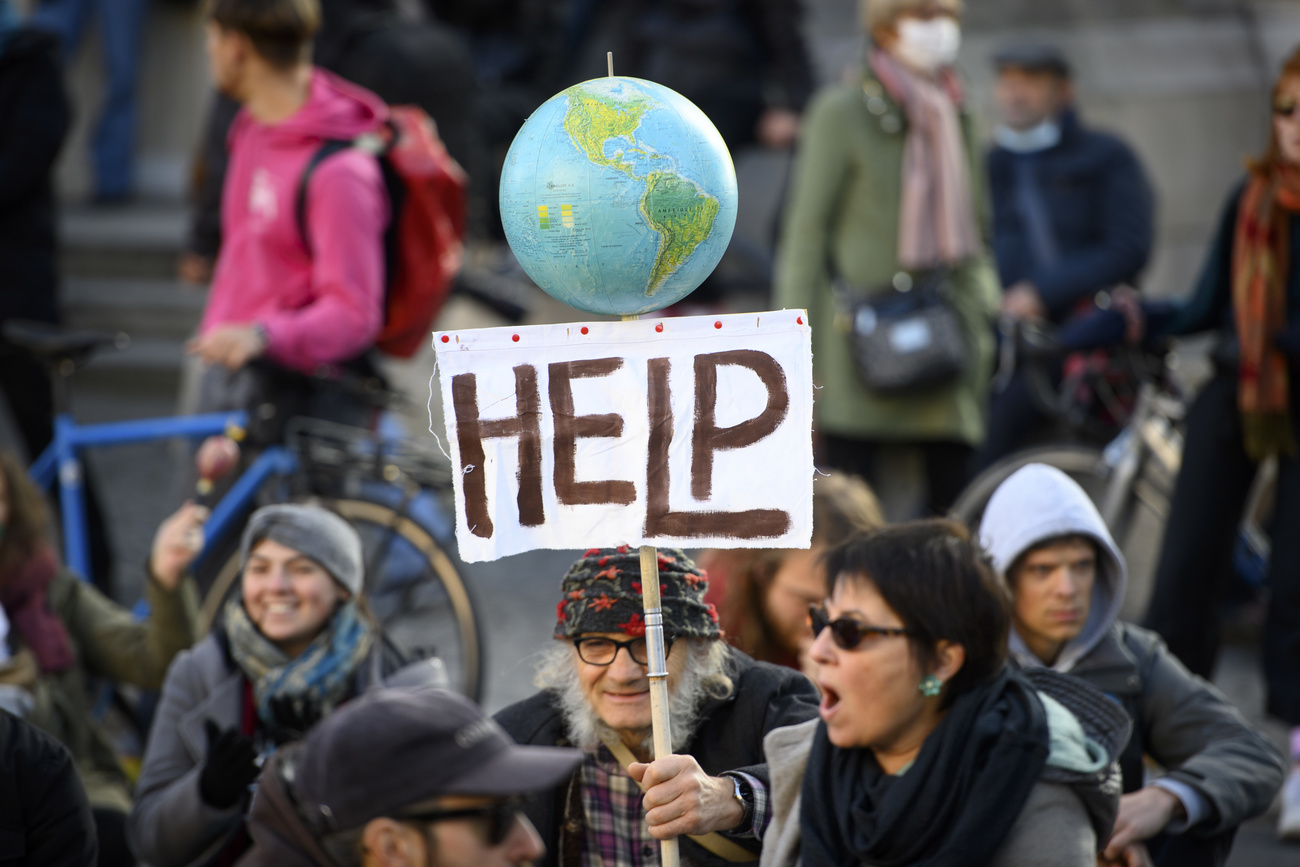Is Switzerland still a credible climate negotiator?

Six years after the Paris climate agreement was signed, Switzerland has had to backtrack on some of the more ambitious goals it had set on climate change mitigation. At the COP26 summit, nonetheless, it has advocated hard for its model of a carbon offset mechanism elaborated in treaties with a handful of developing countries. But is the Alpine nation still legitimate as a negotiator ?
Heckled as she left a press conference on Thursday by a protester shouting that Switzerland should be ashamed of using poor countries to offset its own emissions, Swiss Environment Minister Simonetta Sommaruga briefly stopped to listen before walking over to a group of Swiss journalists waiting to interview her.
At COP26, which is drawing to a close, Switzerland is hoping to lead talks on a set of global rules around carbon offsetting – a mechanism which allows companies, governments and individuals to cancel out the impact of some of their emissions by investing in projects elsewhere that reduce or store carbon.
Countries are divided over how to count emission reductions and whether carbon offsetting schemes are actually resulting in genuine CO2 reductions. Switzerland, as one of the few countries to have rolled out offsetting schemes, wants to position itself as a thought leader on the issue.

More
COP26 blog: Live from Glasgow
Switzerland is also active in other key discussions ongoing in Glasgow, including defining a finance target for developing countries to help them mitigate climate change, and setting a timeframe on how often countries should submit their climate goals.
But after the rejection last summer by Swiss voters of a revised CO2 law which aimed to curb its greenhouse gases, the country’s role as a credible negotiator has been called into question.
The main question to Sommaruga during her press conference regarded Article 6 of the Paris Agreement, which sets guidelines for carbon markets, and is one of the key issues of discussion in Glasgow.
“Article 6 is very important, because if we want more ambition for climate protection, the market rules must be very clear and robust,” Sommaruga told SWI swissinfo.ch, referring to the agreements established with developing countries. “It is in the interest of both countries not to have a situation of double counting. It is in their interest that we have more reductions, and this is in the interest of climate protection.”
She added: “It is very clear that Switzerland has to make more CO2 reductions in our country”, and that a new CO2 law proposal will be soon presented. “Of course, we have to do our work at home, but if we can –thanks to investments – bring about even more reductions of CO2, we should do that.”

Missed opportunities
Not all are convinced Switzerland is doing enough. Maurus Pfalzgraf, a 21-year old student from Schaffhausen, said that after he listened to plenary discussions, he felt that Switzerland was not really engaging with developing countries. “I am a bit ashamed at being Swiss now,” he said.
On finance, another youth activist, Lorenz Henggeler, 25, from Zurich, said as a wealthy country, Switzerland should be contributing more to poor countries on the frontlines of the climate crisis. “If there is one country that should take the lead in financing adaptation and mitigation in climate change, Switzerland would be a prime candidate.”
The Climate Action Tracker, a group analysing governments’ climate action, has qualified Swiss climate finance as “highly insufficientExternal link” based on the fair share that each country should be contributing. This is calculated by the expected global warming trajectory according to global climate pledges by each country.
In the Paris negotiations held in 2015, Switzerland – as part of the Environmental Integrity Group which included South Korea, Mexico, Liechtenstein, Georgia and Monaco – proved to be a moderating voice in bringing together parties from other groups less reluctant to stronger climate action. In particular the country served as something of a counterpoint to the so-called Umbrella Group that includes Australia, the United States, Canada and New Zealand.
At the opening of this year’s conference, Switzerland, on behalf of the group, called for “COP26 to launch efforts to define a post-2025 finance target”. The current target, set in 2009, of $100 billion (CHF92 billion) in funding to developing countries to help them deal with the effects of climate change has to date remained unmet.
Meanwhile, Switzerland, together with Rwanda has been brokering a deal to break a deadlock amongst opposing positions on the issue of so-called common timeframes in the Paris Agreement, on whether countries should submit pledges on a five- or ten-year basis.
Harjeet Singh, global climate lead at NGO ActionAid said countries should adopt the five-year option. This could include a clause, proposed by developing countries, to review the pledges every year. “Every year we should be taking stock of where we are every year. So if Switzerland can really adopt that proposal from vulnerable countries, that would be a massive contribution.”

But can Switzerland live up to its ambitions? Rupa Mukerji, senior climate change advisor at the NGO Helvetas, said the country’s negotiating role has however been weakened by this year’s CO2 law referendum.
“It is quite clear that there is no Swiss law and there is no framework that is modern and forward-looking to guide the negotiators,” she commented. “They (Switzerland) seem to be stuck in limbo. This is basically due to the outcome of the referendum. It is a difficult situation and there is no guidance coming from the legal framework.”
Sommaruga told SWI swissinfo.ch on Tuesday that Switzerland’s selection by the COP presidency to head the group showed that the country “still has a lot of credibility and confidence here, and this will not change with the referendum.”
She said the Swiss example of working with its population to find a solution may even be an example for other countries.
Energy sector influence?
But beyond its official presence, Switzerland’s role as a hub of energy trading has been criticised amid mounting pressure to decarbonise. A first-ever mention of phasing out coal and subsidies to fossil fuels was made in a draft decision presented ahead of the final COP26 text.
Commodity trader Trafigura joined a group of 25 global firms in the First Movers Coalition, a platform intended to generate markets for clean technologies, announced at COP26 and created by the US government and the World Economic Forum. The Geneva-based firm has said that decarbonising shipping is urgent. It also published a paper demanding that governments incentivise investment in hydrogen trucking.
NGOs have been critical of energy companies for the influence they exert at the Glasgow talks. They argue their interests run contrary to the aim of phasing out fossil fuel subsidies, as included in a draft decision presented to negotiators. “They have a huge presence here, possibly bigger than some country delegations,” said Mohammed Adow, director of Powershift Africa, a think tank based in Kenya.
He said oil traders “need to be looking for alternative jobs, particularly in the new world where renewables are going to be central.”
Tzeporah Berman of Stand Earth, an environmental campaign, said that “ultimately governments have to put in place policies that exclude new extraction, especially in biodiversity hotspots.”

In compliance with the JTI standards
More: SWI swissinfo.ch certified by the Journalism Trust Initiative



You can find an overview of ongoing debates with our journalists here. Please join us!
If you want to start a conversation about a topic raised in this article or want to report factual errors, email us at english@swissinfo.ch.